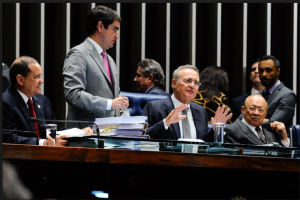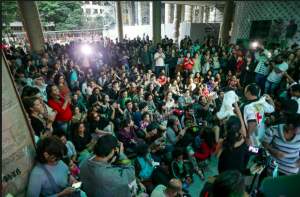by Sonia Corrêa and Fábio Grotz *
 It is not exactly easy to keep track of the Brazilian political development these days. On May 11th, the Brazilian Senate confirmed the admissibility of the impeachment of President Dilma Rousseff, which had been approved by the House on April 17th. The elected president has thus been removed from her post for a period of 180 days, during which the impeachment procedures will continue. Though the admissibility of the impeachment followed constitutional rules properly, citing the 1950 law that defines impeachment procedures, from apolitical point of view, the whole operation was a tour de force that can be and has been interpreted as a threat to Brazil’s democratic institutions, or a ‘ coup.’ Ernesto Samper, former president of Colombia and current president of UNASUR, for example, correctly noted that in justifying the removal of an elected president on the basis of administrative acts, the Brazilian Congress has opened up a very dangerous precedent. More importantly, from whatever angle we examine the scenario, a conservative restoration can be seen to be definitely underway in Brazil.
It is not exactly easy to keep track of the Brazilian political development these days. On May 11th, the Brazilian Senate confirmed the admissibility of the impeachment of President Dilma Rousseff, which had been approved by the House on April 17th. The elected president has thus been removed from her post for a period of 180 days, during which the impeachment procedures will continue. Though the admissibility of the impeachment followed constitutional rules properly, citing the 1950 law that defines impeachment procedures, from apolitical point of view, the whole operation was a tour de force that can be and has been interpreted as a threat to Brazil’s democratic institutions, or a ‘ coup.’ Ernesto Samper, former president of Colombia and current president of UNASUR, for example, correctly noted that in justifying the removal of an elected president on the basis of administrative acts, the Brazilian Congress has opened up a very dangerous precedent. More importantly, from whatever angle we examine the scenario, a conservative restoration can be seen to be definitely underway in Brazil.
Furthermore, since May 12th, when Vice President Michel Temer took office, the interim government has not been behaving as a provisional administration, but rather as if it is here to stay. In order to keep tight reign over Temer’s congressional majority, a ministerial cabinet has been formed that it is basically composed of conservative members of the House who are well known for their bargaining style of politics. An Evangelical pastor is now the Minister of Industry. Several other ministers are being investigated for corruption.[1]
Not surprisingly, two ministers have already been removed in the past two weeks (Planning and, ironically enough, Transparency) after having been taped in phone conversations that revolved around strategies aimed at obstructing the Car Wash investigation: the main institutional trigger of the ongoing crisis. Then as this article was being revised the Regional Electoral Tribunal of São Paulo issued a decision on case on the financial management of the 2014 electoral campaign that suspends the right of the interim president Michel Temer to be elected for the next eight years. On June 7th, as this was made public, the Office of the Federal Prosecutor ordered of four top politicians: ex president José Sarney, Romero Jucá, the planning minister removed last week, Eduardo Cunha, who presided over the House until a month ago, but also Renan Calheiros, the head of the Senate who presides over the impeachment continues to be processed.
Despite this glaring frailties and instabilities, the interim government has already taken series of drastic measures. It downgraded the Secretariats of Human Rights, Women and Racial Equality to appendices of the Ministry of Justice and Citizenship. It initially did the same with the Ministry of Culture, transforming it into a secretariat of the Ministry of Education. Without legal base, the government changed the operating rules of the public communication system and subordinated Social Security to the Ministry of Finance. These immediate measures intended to demonstrate to the “market” that the administration is committed to implementing an extreme neoliberal agenda as quick as possible, despite the evidence of the damage this policy model causes, now including reports by experts from the IMF itself. This rapid pace is not restricted to the executive branch: it is also being propelled through Congress. In the last week of May, the government approved a new fiscal target, paving the way for the establishment of a ceiling for public spending that will negatively impact public health and education financing.
Protests have multiplied across in Brazil and internationally. The most visible, internationally, are the rebellions of groups and individuals publicly contesting the demise of the Ministry of Culture, which gained global attention during the Cannes film festival. The effect was quite immediate: the Ministry was rapidly recreated, but the protests have not yet waned. During the first week-end of June social media outlets informed of more than 400 protests against the Temer administration across the country.
The other salient feature of the restoration concerns its regressive effects on the realms of gender equality, reproductive autonomy and sexuality. The first and foremost symptom of these regressions could even be photographed: Temer’s “cabinet of white men”. It provoked immediate and widespread criticism within Brazil, as it can be illustrated by the ironic and acid cover of the monthly magazine Revista Piauí (on the right), but also internationally. As if to contain this avalanche, the interim president began an intense search for women to assume the recreated Ministry of Culture and other posts in the second layer of the federal administration. He did not have much success, however, as almost all of the women he sought out declined, and the Ministry of Culture ended up being given to another white male minister. The few positive responses, however, ended up producing a chimera. Silvia Bastos Marques, a “modern” liberal executive, now chairs the National Bank of Economic and Social Development (BNDES), where she will implement, among other measures, a new round of privatizations. Flavia Piovesan, a renowned feminist lawyer, has, under strong criticism from civil society and academic sectors, accepted the Secretariat of Human Rights, now lodged in the Ministry of Justice. Last but not least, the likewise reduced Secretariat for Women’s Policies was given to Fatima Pelaes, an Evangelical House representative who has been involved in cases of misappropriation and is well known for her positions contrary to abortion, even in the case of rape.
 As soon as Pelaes was nominated the new Secretary was not only widely criticized, but also challenged by sharp realities of gender. Her first task upon taking office will be the management of the crisis that emerged after two cases of gang rape in Rio and Piauí, which have created a national uproar, contributing a bit more to the demolition of Brazil’s national image in the international press. Either because the outcry against rape culture that took to the streets in the last week of May was extremely strong, or because Pelaes herself has been reprimanded and told to avoid inciting further criticisms of the interim government, the new Secretary has already declared that she has changed her mind and that she is no longer against abortion in the case of rape.
As soon as Pelaes was nominated the new Secretary was not only widely criticized, but also challenged by sharp realities of gender. Her first task upon taking office will be the management of the crisis that emerged after two cases of gang rape in Rio and Piauí, which have created a national uproar, contributing a bit more to the demolition of Brazil’s national image in the international press. Either because the outcry against rape culture that took to the streets in the last week of May was extremely strong, or because Pelaes herself has been reprimanded and told to avoid inciting further criticisms of the interim government, the new Secretary has already declared that she has changed her mind and that she is no longer against abortion in the case of rape.
Pelaes was not, however, the only voice of the interim government to express a regressive position on abortion. As soon as he was nominated, Ricardo Barros, the acting Health Minister (whose electoral campaigns for the House have been financed by private healthcare companies) deployed erroneous figures to talk about abortion as a serious public health problem. Barros also said that “because this issue is very sensitive, the churches must be consulted on the matter” (as if they not been already hip deep in “the matter” for some time now, being the most politically influential voices in the debate on abortion). Barros has also made statements suggesting that the public health system – already very debilitated as a principle platform for implementation of sexual and reproductive health policies – is now under threat. He declared that the scale of the system should be revised, its model reviewed and that access private health insurance should also be expanded so as to reduce the current levels of public investment in health. Higher-ups reproached Barros, and, on the very same day he made his comments, he publicly revised his position.
The vaudeville spectacle currently underway in the executive branch is so intense, with some ministers falling and others retracting their comments, that the dynamics of Congress — where many threats on gender equality and sexual and reproductive rights have lately been proliferating — have been somehow obliterated from the public mind in the last few weeks. It is not wise to lose sight of the risks that are thriving there, however.
At noted in previous SPW reports (here and here) , a number of nefarious bills were processed through the House in 2015 (PL 5069, the Statute of the Family and Statute of the Unborn) and are now on the verge of approval. This may happen as soon as the dynamics of the House becomes more stable and the economic items on the conservative restoration agenda are processed. But new potential legislative setbacks must also be looked at. A few months ago, a conservative representative from the State of Pernambuco announced he would introduce a bill to drastically increase the penalties for the “abortion of babies with microcephaly”. Then, shortly after the impeachment, the Evangelical group in the House began moving to veto the decree signed by President Dilma, in April, which grants travestis and trans persons the right to use their adopted names in bureaucratic procedures in all bodies of the federal administration. The latest bad news is that another known conservative, pastor representative Marcos Feliciano called for a House Plenary Session to discuss “gender ideology”.
For the last few years, the conservative camp has not just been pushing for new regressive legislation but also investing much energy in undoing what has been done with regards to gender equality, sexuality and reproductive rights over the past few decades. These trends are decidedly intensified today. It is not, therefore, unrealistic to predict that, sooner or later, initiatives will be taken to accelerate the adoption of a constitutional amendment aimed at guaranteeing the ”right to life from conception on”. It is worth recalling that since the mid 1980s, when this premise was ruled out in the reform of the constitution, Brazil has become a principle target of international anti-abortion forces, which are organically linked with well known actors in the Brazilian moral conservative camp. This is the case, for example, of the Catholic lawyers Yves Gandra and Helio Bicudo and their younger disciple, Professor Janaína Paschoal, who were the main architects of the impeachment process.
Rape, politics and criminal law: brief reflections
As mentioned above, two brutal cases of gang rape took place, one in Rio de Janeiro and the other in the state of Piauí (the first with greater media repercussion because it was filmed and posted on the internet). These tragic episodes intertwine in many ways with the intricacies and ramifications of the conservative restoration. It is important to recall that Rio and Piauí have previously seen other brutal cases of sexual violence. In 2013, a foreign tourist was raped in a public transportation van in Rio. In May 2015, a group of teenagers led by an adult raped and brutally assaulted a group of girls, killing one of them in a small town in Piauí. The episodes gained high media visibility but did not provoke the outbreak of feminist demonstrations and public protests which we are now witnessing.
This explosion of outrage is undoubtedly linked to the wider political scenario and the potential reverses it implies. It pulls and extends the threads woven by feminist occupations and social media mobilizations that erupted at the end of 2015 to protest sexual harassment and, more importantly, to contest Bill PL 5069, which redefines sexual violence and imposes restrictions on abortion in the case of rape.
 The current ebullition also builds upon the April 2016 rebellions against the idealized image of the interim first lady (“beautiful, modest and housewifely”). It evokes analogies between the forced domination of women’s bodies and the power games recently used to control the political body and it illuminates connections between what takes place in living world of gender and sexuality and the realms of statecraft.
The current ebullition also builds upon the April 2016 rebellions against the idealized image of the interim first lady (“beautiful, modest and housewifely”). It evokes analogies between the forced domination of women’s bodies and the power games recently used to control the political body and it illuminates connections between what takes place in living world of gender and sexuality and the realms of statecraft.
For example, while the Rio rape case was running in the newspaper pages, the interim Ministers of Education received with honors TV actor Alexandre Frota, who is known for his conservative and chauvinist politics. Commenting on the fact, writer João Paulo Cuenca, in an article entitled The Ministry of Culture and Rape Culture ( here in Portuguese) expressed his indignation, recalling that Frota had once declared on a TV show that he had raped an Afro-Brazilian female spiritual leader. Cuenca draws attention to the fact that, fictional or not, this declaration was received with applause and laughter by the audience, just as the rapists of 17 year old girl in Rio laugh in their video, which went viral on the internet. If we recall that dogmatic Evangelical leaders and politicians, who politically support the two ministers visited by Frota, also systematically target Afro Brazilian religious cults and practices for ridicule and repression the ideological and racist contours of this “cordial visit” become glaring.
In an article entitled The war on drugs also violates bodies (here in Portuguese) Judge Luis Carlos Valois illuminates another angle of how the high sphere of statecraft and the micro politics of sexual violence are articulated. Critically revisiting the Rio gang rape case, which occurred in the context of drug trafficking, Valois examines how the hegemonic policy model of the “war on drugs”, adopted in Brazil and elsewhere, is the one main factor underlying the consolidation of violent masculinities in both the fields of public security and drug trafficking:
If there were no prohibition of drugs, neither drug dealers nor the violence involved in the drug trade would exist…. The war on drugs kills innocents, violates bodies and disrespects intimacies within a militarized pattern that reinforces a stereotypical male model. Both the police and the drug dealers are militarized; battles occur on the open street; rapes and deaths are the casualties, accidents of this stupid war.
In addition to establishing the connections between securitization and violent masculinities, Lavois’ reflections also inspire us to critically revisit how the just repudiation of rape culture can also feed the expansion of the state security apparatus and state punitive powers — not a minor topic in view of current political conditions. For example, in his first interview as the new interim Minister of Justice, Alexandre de Moraes said that gender-based violence would be one of his priorities. Using strong tutelary language, he declared that big investments would be made in order to ensure the state’s protection of women. It was as if he was announcing, as a sort of premonition, what would be the interim government’s response to the rape crisis that ensued.
It should be noted, however, that the preferential option for a punitive approach as a response to gender and sexual violence is not peculiar to conservative politics. Rather, it is a prevalent response, found almost everywhere in Brazilian culture. As observed by a number of authors on the left, feminists and other social movements also do not critically reflect upon the implications and effects of calling for the expansion of the punitive power of the state. [1].
The measures that were presented by the interim government this week as a ”new and vigorous plan to curtail gender and sexual violence“ are, in fact, a reshuffling of policies adopted since the 2000’s, centered on protection and punishments. Furthermore, the crisis allows for due legal procedures to be bypassed by state authorities and is triggering more strident appeals for hyper criminalization. Jurist Lucas Sada, for example, showed how the just revulsion caused by the Rio gang rape has made it easier for investigators to use police proceedings and judicial measures that overrun the legal parameters of criminal procedure and constitutional guarantees. Concurrently, the governor of Rio called for the adoption of the death penalty for gang rapes and the Senate quickly approved new legislation that increases penalties in these cases.
However, no consistent call or elaboration has yet been made in terms of what is to be done in the medium and long term –(in both the social and state domains), which can alter the structural conditions and factors that underpin rape culture. Though it may be hard to push this debate under current political conditions, the problematic implications of privileging a punitive State response to sexual violence should not be swept under the carpet. It is therefore productive for Brazilian feminist and other progressive actors to look to India for inspiration, as many similarities can be traced between what happened there after the 2012 Delhi gang rape and what we are now witnessing in Brazil today. As noted by Ratna Kapur in an article published in The Hindu right after the tragic and brutal episode:
What is required at this stage is not more protection and security, but education. …More laws — or calls for the death penalty — are not the answer to what is a deeply ingrained societal problem… Legal reforms in the area of rape have been taking place for three decades, but they do not appear to have arrested the appalling levels of violence to which Indian women are subjected. It is time for us to recognize how we as a society are implicated in producing the very individuals who are perpetrating such heinous crimes against women and to start taking responsibility for bringing this to an end.
English review: Thaddeus Blanchette
Notes
__________________________
[1] Symptoms of this conservative restoration have been palpable for quite sometime. This can be illustrated, for example, by the fact that a third of the ministers nominated by the interim government have been part of either presidents Lula or Dilma’s cabinets.


